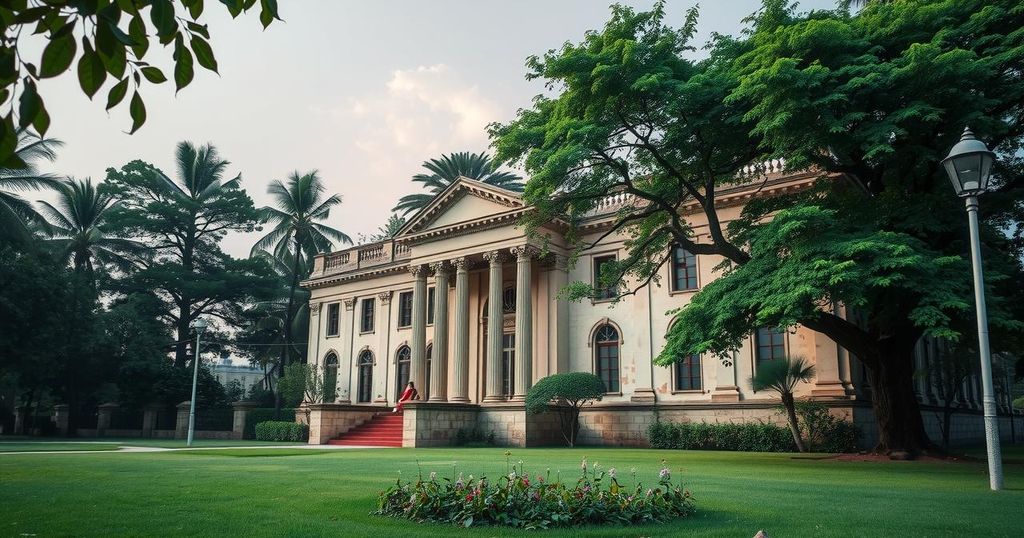Cameroon: The Future of Governance Under Paul Biya’s Continued Leadership
Cameroon’s elections may see 91-year-old President Paul Biya seek an eighth term, raising concerns about his health and ability to govern. While some citizens support his candidacy, critics question the sincerity of opposition parties and worry about the implications of his advanced age on national crisis management. Meanwhile, economic challenges persist amid high corruption, underlining the struggle for effective leadership in a divided political landscape.
In the upcoming elections in Cameroon, President Paul Biya, now 91, is anticipated to seek an eighth term, solidifying his position as Africa’s longest-serving leader. Political analyst Dr. John Akpo asserts that Biya’s candidacy seems inevitable, despite rising concerns about his health. A party member, Elvis Ngolle Ngolle, stresses preparations for the elections, declaring that discussions about leadership changes are unwarranted at this juncture.
Biya has governed for over 42 years, and if re-elected, he could be 99 by the next elections in 2032—a prospect sparking discussions on his capability to lead. Akpo indicates that claims of opposition support for Biya often represent insincere satellite parties created to weaken genuine opposition efforts. He believes that the discontent many citizens feel regarding their leadership is palpable.
Although Biya is viewed as a pioneer of multi-party democracy and has strengthened ties with Western nations, his leadership coincides with a prolonged civil war caused by Anglophone separatists, severely affecting economic growth. Opposition attorneys express skepticism about Biya’s ability to manage the growing crises attributed to his age, suggesting that his absence from impacted regions hinders his understanding of their realities.
Critics argue that instead of engaging in constructive dialogue, Biya has opted for oppressive measures against political dissent, resulting in the imprisonment of peaceful protesters, including Maurice Kamto, the opposition’s 2018 presidential runner-up. The ruling Cameroon People’s Democratic Movement (CPDM) heavily relies on its coalition partners to maintain its parliamentary majority, though recent elections have seen diminished support for these partners.
Recent comments from Catholic bishops advocating for improved governance drew condemnation from government officials, although they reportedly did not directly call for Biya’s resignation. The bishops emphasized the need for better living conditions without provoking conflict with the state, a stance likely to resonate with the divorced beliefs of Cameroon’s largely Catholic populace.
Recently, Cameroon’s economy showed signs of recovery, with GDP growth at 3.7% in early 2024, attributable to service sector improvement. Nonetheless, poverty remains a challenge, as approximately 23% of citizens live beneath the extreme poverty threshold amid a backdrop of high corruption levels, with Akpo emphasizing that corruption permeates every governmental layer.
Cameroon confronts various structural challenges such as inadequate infrastructure and a heavy reliance on commodity exports, which inhibit sustainable development. The critical question remains whether these issues will be addressed under another term for Biya, especially as the fragmented opposition struggles to present credible alternatives. Lawyer Michele Ndoki articulates that the desire for stability may account for Biya’s continued reign, despite doubts about his competency at his advanced age.
Cameroon is experiencing a pivotal moment as President Paul Biya, having been in office for over four decades, prepares to potentially extend his leadership amid critiques of governance and deteriorating public welfare. His age and political longevity raise concerns regarding his ability to address the country’s pressing social and economic challenges, particularly given the backdrop of ongoing civil unrest and a divided opposition. The upcoming elections also spotlight the complex dynamics between the ruling party and opposition factions, many of which are perceived as lacking cohesion and clarity in their messaging. Additionally, the religious landscape in Cameroon, particularly the influence of the Catholic Church, plays a significant role in shaping public opinion and political discourse. As Cameroon wrestles with economic stagnation and high corruption perceptions, the effectiveness of its leadership under Biya and the prospects for change are more critical than ever.
In conclusion, the impending elections in Cameroon are set against the backdrop of Paul Biya’s continued assertiveness in reclaiming leadership. His advanced age and long tenure draw significant scrutiny from both critics and supporters, highlighting fears regarding effective governance amidst economic and civil crises. Despite the fragmented opposition failing to offer strong alternatives, many citizens remain uncertain but hopeful for change, underscoring the complex political fabric of the nation.
Original Source: www.dw.com




Post Comment